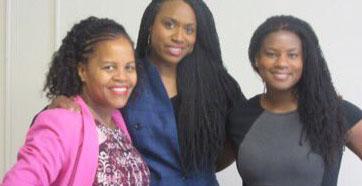November 16, 2017

Councillor Pressley, center, with Councillor-elect Kim Janey, left, and Councillor-elect Lydia Edwards, right. Courtesy Pressley campaign
This election marks a milestone for the veteran woman on the council,says at-Large Councillor Ayanna Pressley, who will have spent a decade in the at-large seat advocating for healthy communities once this next term finishes.
“I’ve seen that as a mandate from the electorate to continue my work to break cycles of poverty -- really to eradicate poverty, that's my goal -- to break cycles of violence in all forms, to address trauma in our communities, and to fight for women and girls,” she said. “But in broad strikes, how I would encapsulate that is, for eight years, I’ve been building healthier communities and a more equitable Boston.”
Pressley recalls her first few year on the council as targeting “victories that were small enough to win but big enough to matter.” It took work, she notes, highlighting the years it took to finally pass a comprehensive sex and health curriculum, which was adopted by the public schools, or establish an expecting parent and teen policy.
Pressley prides herself on not being “parochial” in her service. She is a Dorchester resident who represents the entire city and readily wades into state issues when it matters.
“I don’t think any of us has said, I will recuse my potential impact on an issue because it’s a state issue I will cede my responsibility and the role I could play because that’s something the mayor would have to endorse.”
Especially in the Trump era, the “individual silos” of city, state, and federal responsibility have “broken down,” she said.
She has not lost sight of the intersectionality of her work, Pressley said. Teen pregnancy rates were intimately tied to educational levels and cycles of poverty. Subsidized liquor licenses allow more neighborhood restauranteurs to invest in underserved communities and become part of new economic engines.
While taking part in a fellowship through the Aspen Institute, Pressley was struck by a comment offered by someone noting her work in anti-poverty measures. “Never forget that situational solutions will never resolve systemic problems,” they told her. “And it was a real shift for me,” Pressley said.
“My priorities haven‘t changed,” she said. "How I approach the work has changed. When I first joined the council, I think I felt more of an imperative and obligation to be raising issues that had not previously been raised on the municipal level. I was keenly aware of this unique lens in terms of advocacy that I had run on, and the opportunity and obligation to honor that once I was there. As I’ve evolved, I’ve been really focused on how do I achieve systemic reform and change in a way that is sustainable, in a way that is not left to the discretion or the whims of future councils or mayors? So everything is policy.”
As a general rule, Pressley avoids speculation on her future beyond the council or the possibility of carving out a new role within it. But she is keeping an eye on her legacy, working to enshrine her advocacy in legislation.
“Tomorrow’s not promised to any of us, and the council’s gone through many iterations and will continue to, and I don’t want that agenda and those issue to be imperiled left to political whims and individual discretion of people.” she said. “I want those things to remain.”
Topics:



